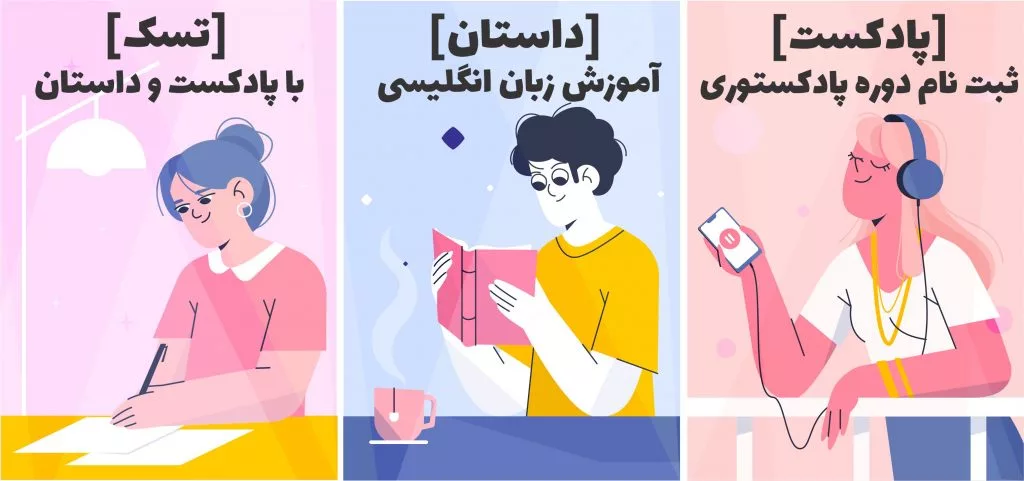پادکست انگلیسی BBC – معذب بودن
همه ی ما تجربه اش کردیم؛ اون سکوت عذاب آوری که یخ کردیم نمی تونیم حرف بزنیم، به یه جای دیگه نگاه می کنیم یا آرزو می کنیم که نامرئی بشیم. حس معذب بودن میتونه در بدترین شرایط سراغ هر کسی بیاد. اما چرا؟ چطوری به قوانین مرتبط میشه و اصلا چه ربطی به جامعه داره؟ آیا شما زیاد دچار این حس میشید؟ تو این شرایط چی کار می کنید که حس بهتری پیدا کنید؟ (نظر خودتون رو به انگلیسی در بخش دیدگاه با ما در میون بذارید!) در پادکست انگلیسی BBC – معذب بودن می شنویم که نیل و دن درمورد این قضیه صحبت می کنند و در طول مسیر کلمات مرتبط آموزش میدن.
سوال پادکست انگلیسی BBC – معذب بودن :
Which city has the oldest underground railway? Is it:
a) London
b) New York or
c) Tokyo
به پادکست خوب گوش کن تا جواب رو پیدا کنی.
اگر می خوای گوش دادن به پادکست تا حد امکان برات ساده و کارآمد باشه مراحل زیر را دنبال کن:
هر روز به پادکست گوش کن. وقتی براش یه وقت ثابت در روز در نظر بگیری برات تبدیل به عادت میشه و این عادت هرروز پیشرفت میکنه.
پادکستی رو پیدا کن که موضوعش برات جالب باشه. وقتی از خود موضوع لذت ببری یادگیری هم برات لذتبخش میشه.
به پادکستی گوش کن که transcript یا متن داره. این بهت کمک می کنه تا کلمات و عبارات جدید رو به سرعت در متن پیدا کنی و ساختار انواع مختلف جمله رو خوب یاد بگیری.
پس از گوش دادن به پادکست با متن، در مرحله بعدی سعی کن بدون نگاه کردن به متن این کار رو انجام بدی. این کار مهارت شنیداری رو تقویت می کنه و کمک می کنه تا انگلیسی زبانان بومی را راحت تر درک کنی، حتی اگر خیلی سریع صحبت کنن.
اگه به پادکست انگلیسی گوش کردی و نتونستی کامل متوجه اش بشی، ناامید نشو. پادکست هایESL -English as Second Language بیشماری وجود دارن که برای سطوح مختلف، از ابتدایی تا پیشرفته طراحی شدن. مطمئنا هر روز می تونین یه پادکست مناسب با سطح خودت پیدا کنی.
فراموش نکن که هرچی بیشتر تمرین کنی در اون مهارت رشد میکنی! به قول انگلیسی ها: Practice makes perfect
واژگان کلیدی پادکست انگلیسی BBC - معذب بودن
| معنی به فارسی | معنی به انگلیسی | واژه |
| احساس ناراحتی و معذب بودن | feeling uncomfortable, self-conscious or embarrassed in a social situation | awkward (adjective) awkwardness (noun) |
| ضمنی، تلویحا فهمانده شده | not spoken or written down, but still understood | implicit |
| قوانین اجتماعی | the way we behave in society in particular situations so that we can live together peacefully | social rules |
| حکمرانی کردن | to rule, to control | to govern |
| روشن کردن مسئله ای | to make something easier to understand, to clarify | to illuminate |
| نقض کردن (یک قانون) | to breach (a rule) | to breach (a rule) |
BBC 6 minute English - Why do we feel awkward

متن پادکست انگلیسی BBC - معذب بودن
Note: This is not a word-for-word transcript
Neil
Hello and welcome to 6 Minute English. I’m Neil.
Dan
And I’m Dan.
Neil
Now then, Dan, do you ever feel awkward?
Dan
Awkward?
Neil
Yes, feeling uncomfortable, embarrassed or self-conscious in a social situation where something isn’t quite right.
Dan
Sometimes. I remember always feeling very awkward watching TV with my parents if there was an explicit love scene. You know, people canoodling.
Neil
Oh yes, me too! And that feeling of awkwardness is what we are looking at in today’s 6 Minute English, and how it is all connected to social rules.
Dan
Social rules are the unspoken rules which we follow in everyday life – the way we interact with other people and particularly with strangers.
Neil
Yes. For example, if you’re waiting at a bus stop, it’s OK to talk about the weather to a stranger.
Dan
But it would be very awkward if you broke that social rule by asking them about, oh I don’t know, how much money they earned.
Neil
Oh yes, that would be wrong, wouldn’t it? And we’ll find out about another awkward situation on the underground railway later in the programme. Before that though, a quiz. Which city has the oldest underground railway? Is it:
a) London
b) New York or
c) Tokyo
Dan
Aha! Well, I’m pretty confident about this! I think it’s London.
Neil
Well, I’ll have the answer later in the programme. Dr Raj Persuad is a psychologist. He was a guest on the BBC radio programme Seriously. He was talking about social rules. How does he say they affect our lives?
Dr Raj Persaud
How do we understand what the implicit social rules are that govern our behaviour? They’re so implicit. They’re so almost invisible – yet we all obey them – i.e. they’re massively powerful that the only way to get at them, because you couldn’t use an MRI brain scanner or a microscope… What’s the tool you would use to illuminate the social rules that actually govern our lives?
Neil
How do they affect our lives?
Dan
He says that they govern our behaviour, they govern our lives – this means that they ‘control’ our lives. They ‘rule’ our lives.
Neil
What’s interesting is that he says these social rules are implicit. They are not written down anywhere. They are unspoken but understood.
Dan
If they are unspoken and not written down, how can scientists and sociologists study them? How can they find out about them? They need a way to illuminate the rules. This means a way of shining a metaphorical light on them to see what they are.
Neil
Here’s Dr Persaud again.
Dr Raj Persaud
How do we understand what the implicit social rules are that govern our behaviour? They’re so implicit. They’re so almost invisible – yet we all obey them i.e. they’re massively powerful that the only way to get at them, because you couldn’t use an MRI brain scanner or a microscope… What’s the tool you would use to illuminate the social rules that actually govern our lives?
Neil
One way to find out about a rule is to break it. Another word for ‘break’ when we’re talking about rules is breach and breaching experiments were used to learn about social rules. Here’s Dr Persaud describing one of those experiments.
Dr Raj Persaud
You breached the social rule on purpose. So a classic one – people would go into the Metro, the underground railway – Tube – and there’d be only one person sitting in a carriage. You would go and sit next to that person. And if that led to awkwardness or discomfort, where the person got off the tube stop immediately, you had discovered a social rule.
Neil
So, what was the experiment?
Dan
Well, quite simply, find a nearly empty train carriage and then go and sit right next to someone rather than a distance away. If that person then feels uncomfortable or awkward, and that’s something you can tell by watching their behaviour – for example, do they change seat, move carriage or get off the train completely? If they do, then you know you’ve discovered a rule.
Neil
So you find a rule by breaking it or breaching it. OK, time to review our vocabulary, but first, let’s have the answer to the quiz question. I asked which city has the oldest underground railway. Is it:
a) London
b) New York and
c) Tokyo
Dan, you were pretty confident.
Dan
I was! I said London, but now I’m having second thoughts. I think it might be New York.
Neil
Oh… That’s a little bit awkward, isn’t it? Well, it is London, so I don’t know if you’re right or wrong! I feel a bit uncomfortable now. The facts are that London opened in 1863. New York was 1904 and Tokyo, 1927. Well done, and extra bonus points if you knew any of those dates. Now it’s time for our vocabulary. I hope it doesn’t make you feel awkward, but you can you start, Dan?
Dan
Of course! And the adjective awkward, and its noun awkwardness, are on our list for today. They mean ‘an uncomfortable feeling in a social situation’.
Neil
This is all connected with the idea of social rules – unspoken, but well known rules which we follow in daily life to avoid awkward situations.
Dan
The rules, as Neil said, are not spoken and they are not written down but we know them and understand them. They are implicit.
Neil
And these implicit rules govern our lives. The verb govern means to ‘control and rule’.
Dan
To see something clearly, either in reality or metaphorically, you need to put some light on it. You need illuminate it. And that was the next of our words, the verb illuminate.
Neil
And finally we had a word which means, when we’re talking about rules, the same as break, to breach.
Dan
In experiments they breached the rules to learn more about them.
Neil
Well, we don’t want to breach any rules so it’s time for us to leave you for today. But don’t worry we will be back. In the meantime, you can find us in all the usual places online and on social media, just look for BBC Learning English. Bye for now.
Dan
Bye-bye!
امیدوارم از پادکست انگلیسی BBC - معذب بودن لذت برده باشید.
گوش دادن به پادکست روش خوبی برای تقویت مهارت شنیداری و هم چنین یادگرفتن کلمات در بستر یک موضوع خاصه که این به تقویت مهارت مکالمه انگلیسی نیز کمک زیادی می کنه.
اگه تو هم از اون آدمهایی هستی که از گوش دادن به پادکست لذت می بره برات یه خبر خوب دارم! آموزشگاه زبان انگلیسی 24talk یه دوره طراحی کرده مبتنی بر پادکست و داستان کوتاه به اسم "پادکستوری - Podcastory". این دوره سعی کرده یادگیری زبان انگلیسی رو مناسب با نیاز و سطح زبان آموز به یه فرایند بسیار مفرح، موثر، سریع و کم هزینه تبدیل کنه.
همین الان می تونی با کلیک روی عکس زیر و ثبت نام در دوره ی آموزش زبان انگلیسی با پادکست و داستان ۲۴talk اولین و مهم ترین قدم رو برای یادگیری زبان انگلیسی برداری. وقت رو از دست نده!








